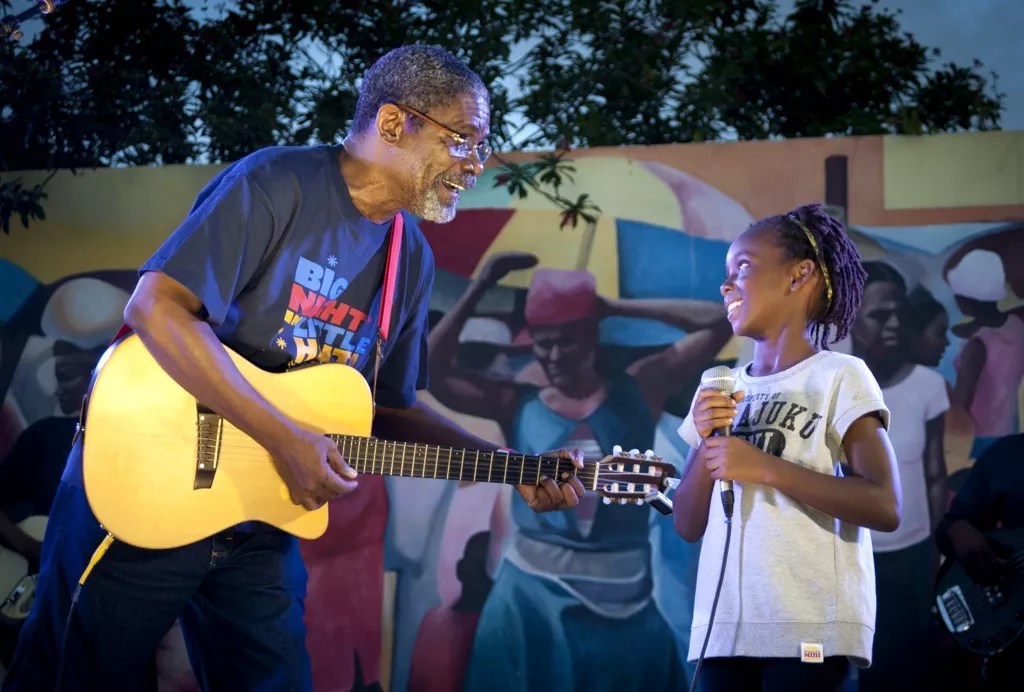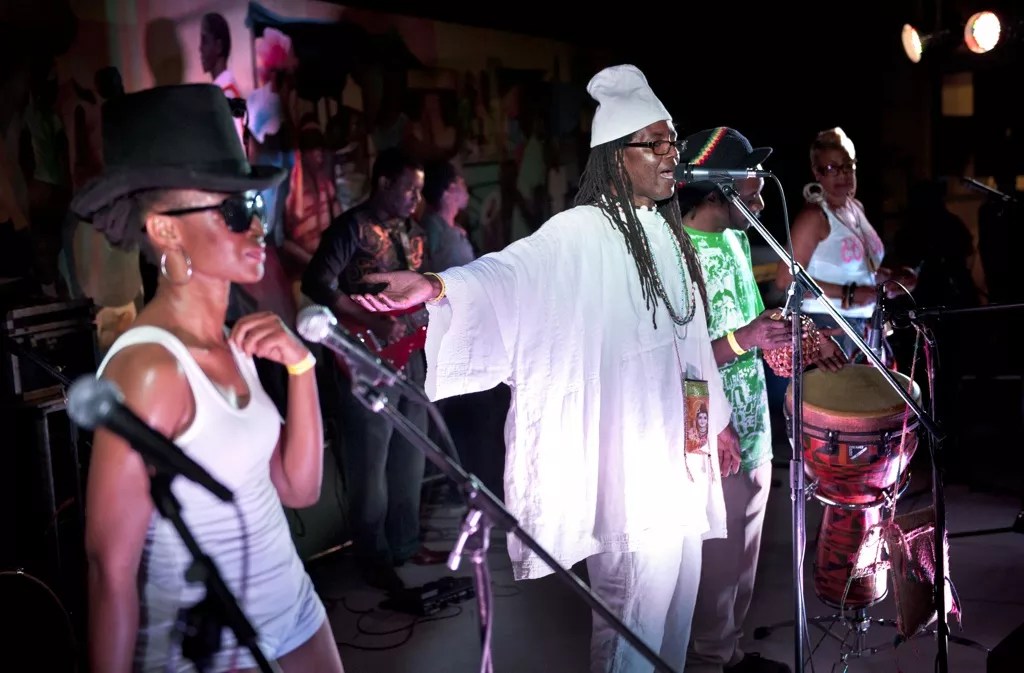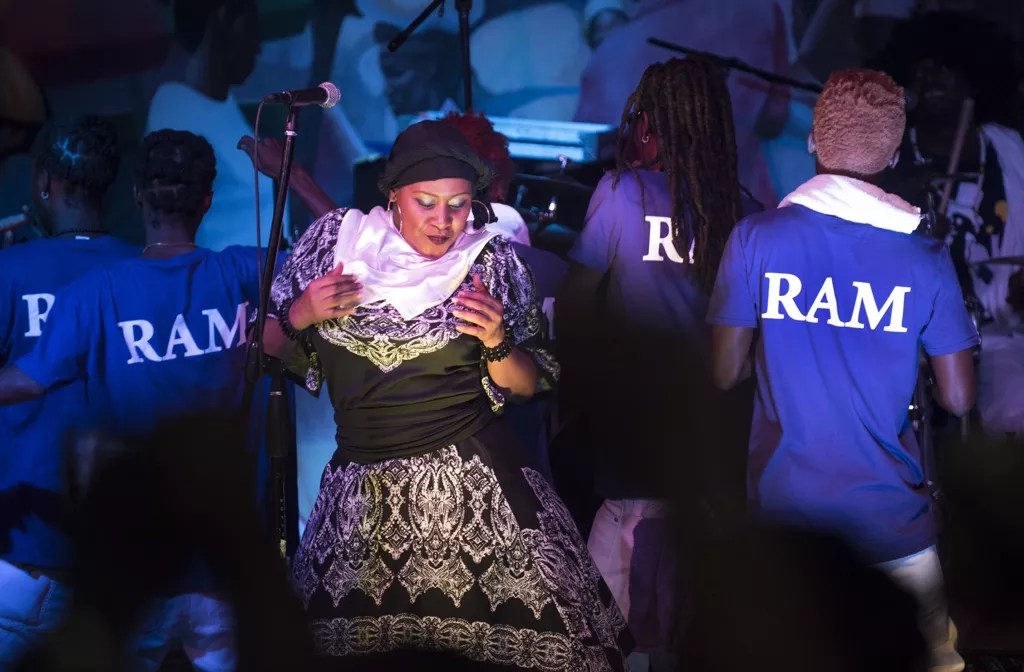
Photo by Luis Olaz

Audio By Carbonatix
When the Rhythm Foundation was born in 1988, the World Wide Web was a year away from invention. For many Miamians, intercultural contact came from reading National Geographic, watching the nightly news, or, crucially, attending one of the foundation’s world-beat shows. Early acts included the likes of South Africa’s legendary jazz artists Hugh Masekela and Miriam Makeba, both of whom the Rhythm Foundation booked through fax and snail mail – and in the midst of apartheid.
Three decades later, the nonprofit international music presenter is still pumping out positive global vibes thanks in large part to its adaptability. The Rhythm Foundation invites Miamians to join it this spring in welcoming the 2020s through Social, a new monthly culinary arts and music project at the North Beach Bandshell.
“Miami used to have this inferiority thing where it was only good it if came from New York or Europe. Now I think Miami people are very proud of ourselves,” says Laura Quinlan, a lifelong Miamian. She has worked with the foundation since its inception and was its executive director for decades until 2018, when she passed the baton to her husband, James Quinlan, one of the organization’s cofounders.

France’s Bajofondo Tango Club plays its electro-tango at the TransAtlantic Festival.
Photo by Luis Olaz
The Intersection of Reggae, Punk Rock, and Old People
When James Quinlan moved to South Florida in 1986, Miami Beach was considered God’s waiting room because of its large number of elderly residents, many of them former garment industry workers or even Holocaust survivors. But as that population began to fade and younger, more diverse people moved in, a few cultural visionaries thought the area could be preserved and revitalized by staging modern entertainment in historic spaces. They included the Cameo Theater on Washington Avenue in South Beach; in 1986, Miami promoter Paco de Onis obtained a 25-year lease on the building and invited Quinlan, who was a music promoter in New York City, to move to South Beach to establish a whole new scene.
“Miami Beach was considered a no man’s land in the music business. I remember my colleagues in New York City saying, ‘Well, nice knowing you. I’m afraid I’m going to just have to take your card out of the Rolodex now because what you’re doing is career suicide,'” Quinlan recalls.
But as the venue transformed, so too did South Beach’s cultural landscape. At the Cameo, Onis and Quinlan hosted a wide variety of international artists, including Jamaican reggae acts Burning Spear and Dennis Brown as well as Nigerian pop star King Sunny Adé. Even more easily marketable acts such as Bad Brains, the Dead Milkmen, Red Hot Chili Peppers, and the legendary Motörhead made appearances.
Quinlan and Onis even produced one of the first shows for the newly renovated Bayfront Park. The brainchild of then-Florida Gov. Bob Graham, Carib Musical was a massive 1988 benefit concert featuring singer-songwriter Jimmy Buffett, best known for his song “Margaritaville”; Latin music legend Eddie Palmieri from the legendary Fania Records; and world-renowned Haitian band Tabou Combo. The funds provided a scholarship for students from the Caribbean to attend Florida’s public universities.
The pair founded the Rhythm Foundation that same year. By making it a nonprofit, they could fund the costs of international travel more easily. Shortly thereafter, Onis left to work in the Latin American film industry, and Quinlan married Laura, who then took charge of the Rhythm Foundation. For the next three decades, James Quinlan chaired the board while working on other cultural projects for Miami Dade College, the City of Miami Beach, Broward Center for the Performing Arts, and his own ventures.
The Transatlantic Festival: The World Beat’s Winter Music Conference
By the early 2000s, the Cameo Theater had become a DJ-centric venue, and Winter Music Conference, which began in Miami Beach in 1985, was now attracting nearly 100,000 attendees a year. The Rhythm Foundation noticed it could bridge these musical experiences by creating a more modern world-beat program, the TransAtlantic Music Festival. Running from 2003 to 2017, this yearly event booked acts such as Bajofondo Tango Club and Nouvelle Vague from France; Chambao from Spain; Seu Jorge and Ceu from Brazil; Jorge Drexler from Uruguay; Ana Tijoux from Chile; Seun Kuti and Bombino from Nigeria; Tinariwen from Mali; and New York City’s Yerba Buena.
Miami’s Latin funk scene grew as well, spurred largely by modern transcontinental migration and the speedy communication enabled by the digital age. Recognizing this synergy, the Rhythm Foundation hired Miami bands such as Spam Allstars, Afrobeta, Locos por Juana, Elastic Bond, Xperimento, Loray Mistik, and Kazak Collective to open its shows.
“Some of those shows were life-changing experiences for me, and I’m certain they were for other artists,” says Spam Allstars founder and leader, Andrew Yeomanson, better known as DJ Le Spam. Yeomanson says these shows empowered Spam Allstars to snag more gigs locally, nationally, and abroad. “[The Rhythm Foundation’s shows] had an amazingly positive effect on our city – so many shared transcendent musical experiences elevating us and bringing us together.”

Local Miami artist and musician Jude Papaloko Thegenus and his band Loray Mistik perform at Big Night in Little Haiti.
Photo by Luis Olaz
Community Redevelopment, Gentrification, and Cultural Adaptation
The TransAtlantic Festival was one of many event series the Rhythm Foundation created or helped to grow. The organization also promotes the North African and Middle Eastern meditative music program the Axis of Love, as well as Italian HITWeek, Dance Band Night, and the neighborhood activation series Ritmo Doral and Hollywood Arts Park Experience, produced for the local governments of those cities.
But the Quinlans, their board members, and community partners say one of their most memorable series came in 2012, just as the art boom in Wynwood and the Design District began pushing into Little Haiti. In an effort to preserve the neighborhood’s artistic and cultural integrity, the James L. Knight Foundation provided funding to revitalize its historic Caribbean Market and build behind it the state-of-the-art Little Haiti Cultural Complex. The refurbishment added an auditorium, classrooms, and a patio decked out in vibrant Haitian murals.
Community leaders also hoped the complex and the programming it generated would break down racial and class biases and give the neighborhood and its people their rightful recognition on the global stage. The Republic of Haiti is the fruit of the world’s first successful uprising of enslaved peoples from Africa. Many historians say Haitian migration to cities such as Miami comes from years of retaliatory postcolonial global policies that have wreaked havoc on the island nation’s economy and political capacity. All of this history prompted Jamaican-born entrepreneur, philanthropist, and community activist Julie Mansfield Soimaud to join forces with the cultural complex and the Rhythm Foundation to create the arts and music program Big Night in Little Haiti. The event series was held on the third Friday of every month.
“We saw an opportunity not only to spotlight a neighborhood with an incredibly rich cultural legacy but also to make entertainment accessible to that same community,” Julie tells New Times.
The event presented a wide array of Haitian genres, including compas, rasin, twoubadou, and jazz, as well as some of Haiti’s biggest bands, such as Tabou Combo, Magnum Band, and RAM. It also showcased the city’s best local Haitian talent, including troubadour and former Port-au-Prince mayor Manno Charlemagne and the band Loray Mistik, led by well-known artist and musician Jude Papaloko Thegenus.
“It was the best thing that ever happened to Little Haiti,” Papaloko says. “It brought people to the neighborhood and opened the doors to everyone. Everyone was treated as an equal.”
No longer a Rhythm Foundation initiative, the project endures as the City of Miami event Sounds of Little Haiti. And though the Little Haiti Cultural Complex continues to represent South Florida’s Haitian community, the rising cost of real estate has prompted many longtime residents to move out of the neighborhood.
Multicultural preservation and promotion is a “very challenging road,” admits Rhythm Foundation board member Asa Sealy. An immigrant from Trinidad and Tobago, he made his mark on South Florida by founding Miami’s Caribbean Carnival, the largest of its kind in the United States. “On the one hand, your approach is that it’s for the community and you see it as a positive contribution. But, yes, you’re going to run into individuals who don’t get that picture.”
He says he has remained on the Rhythm Foundation’s board for more than a decade because it has tried so hard to build a more inclusive Miami.
“The Rhythm Foundation has been able to very diplomatically maneuver through making sure the city or the programming or the venue is well-positioned to grow,” he says. “It’s so in tune with the communities, and I think the communities appreciate that the foundation is able to leverage its cultural sensitivity to what these different pockets require.”

Haitian jam band RAM performs at Big Night in Little Haiti.
Photo by Luis Olaz
The Event Series Social and Its Concept
Amid gentrification, border crises, travel bans, police brutality, hate crimes, and a depleted natural environment, community-engagement efforts are as urgent now as they were during the years of the Cold War and apartheid. And in a cosmopolitan place such as Miami, diverse people-to-people parties might be the ticket to bringing the world’s citizens a little closer together.
The Rhythm Foundation will try to do just that when it holds the first edition of Social this Thursday, February 20, at the North Beach Bandshell. This edition will honor Black History Month by featuring the music of the Florida Southern soul band Black Dove and food from Sparky’s Jerk Cuisine, Soul Samples, Chicosan, and La Gringa Osteria. The March 19 program will focus on wellness and offer a performance by the Miami avant-dance duo Afrobeta and a yoga session courtesy of Skylight Yoga.
And now that the Rhythm Foundation has secured a new nine-year lease on the North Beach Bandshell, James Quinlan is confident the nonprofit has plenty of time to continue the hard work of community cohesion. In fact, he says, the Bandshell’s location in one of South Florida’s most diverse neighborhoods makes it the perfect “town center.”
“Programs at the Bandshell provide a neutral space where all of these publics can gather and celebrate some of the most basic and common human pleasures together: music and food,” he says. “Although many of the programs are coming from culturally specific traditions, we offer them to the wider public in a welcoming setting that is multigenerational and multicultural.”
For Laura Quinlan, Social presents an opportunity for Miamians to celebrate their experiences as a microcosm of the world.
“Now more than ever, there’s an interest in telling Miami stories,” she says. “Our stories are always cultural, international, funny, and sad. That’s like a true Miami story. It breaks your heart and it makes you chuckle.”
North Beach Social: Black Dove. With DJ Benton. 6 p.m. Thursday, February 20, at the North Beach Bandshell, 7275 Collins Ave., Miami Beach; 305-672-5202; northbeachbandshell.com. Admission is free with RSVP via rhythmfoundation.com.
North Beach Social: Afrobeta. 6 p.m. Thursday, March 19, at the North Beach Bandshell. Admission is free with RSVP via rhythmfoundation.com.
North Beach Social: Rambling String Band. 6 p.m. Thursday, May 21, at the North Beach Bandshell. Admission is free with RSVP via rhythmfoundation.com.